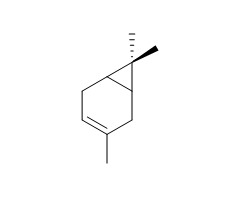3-Carene
3-Carene, may irritate the skin and mucous membranes and prolonged exposure may result in allergic contact dermatitis or chronic lung function impairment. 3-Carene shows stimulatory effect on mineralization, which might be associated with its potential to induce the protein expression/activation of the mitogen-activated protein kinases and the transcript levels of osteoblast mineralization-related genes such as osteopontin and type I collagen.
Inquire / Order:
manager@chemfaces.com
Technical Inquiries:
service@chemfaces.com
Tel:
+86-27-84237783
Fax:
+86-27-84254680
Address:
1 Building, No. 83, CheCheng Rd., Wuhan Economic and Technological Development Zone, Wuhan, Hubei 430056, PRC
Providing storage is as stated on the product vial and the vial is kept tightly sealed, the product can be stored for up to
24 months(2-8C).
Wherever possible, you should prepare and use solutions on the same day. However, if you need to make up stock solutions in advance, we recommend that you store the solution as aliquots in tightly sealed vials at -20C. Generally, these will be useable for up to two weeks. Before use, and prior to opening the vial we recommend that you allow your product to equilibrate to room temperature for at least 1 hour.
Need more advice on solubility, usage and handling? Please email to: service@chemfaces.com
The packaging of the product may have turned upside down during transportation, resulting in the natural compounds adhering to the neck or cap of the vial. take the vial out of its packaging and gently shake to let the compounds fall to the bottom of the vial. for liquid products, centrifuge at 200-500 RPM to gather the liquid at the bottom of the vial. try to avoid loss or contamination during handling.
Korean J. Medicinal Crop Sci.2021, 29(6):425-433
Food Hydrocolloids2024, 152:109898
J Asian Nat Prod Res.2019, 5:1-17
Molecules.2017, 22(2)
Int J Mol Sci.2023, 24(4):3682.
J Biomol Struct Dyn.2022, 1-21.
Nutrients2022, 14(3),695.
Fitoterapia.2015, 100:179-86
BMC Complement Altern Med.2019, 19(1):339
J Cell Mol Med.2023, jcmm.18071.
Related and Featured Products
Phytotherapy Research, 2010, 22(1):18-22.
Low concentration of 3-carene stimulates the differentiation of mouse osteoblastic MC3T3-E1 subclone 4 cells.[Pubmed:
17685387]
Recently, natural products have gained more interest as alternative treatments for metabolic bone disorders and for the maintenance of bone health.
METHODS AND RESULTS:
In this study, the anabolic activities of 89 natural compounds were evaluated by measuring the amount of newly synthesized calcium in the differentiation process of mouse osteoblastic MC3T3-E1 subclone 4 cells. Of these compounds, a low concentration (up to 5 microm) of 3-Carene, which is a bicyclic monoterpene in essential oils extracted from pine trees, was shown to stimulate significantly the activity and expression of alkaline phosphatase, an early phase marker of osteoblastic differentiation, on differentiation day 9. On day 15, it dramatically promoted the induction of calcium in a dose-dependent manner. The stimulatory effect of 3-Carene on mineralization might be associated with its potential to induce the protein expression/activation of the mitogen-activated protein kinases and the transcript levels of osteoblast mineralization-related genes such as osteopontin and type I collagen.
CONCLUSIONS:
Further studies are needed to determine the precise mechanism, but the anabolic activity of 3-Carene in bone metabolism suggested that the use of natural additives to the diet including essential oils could have a beneficial effect on bone health.
Toxicology & Applied Pharmacology, 1991, 110(2):198.
Human exposure to 3-carene by inhalation: toxicokinetics, effects on pulmonary function and occurrence of irritative and CNS symptoms.[Pubmed:
1891768]
Terpenes, especially 3-Carene, may irritate the skin and mucous membranes and prolonged exposure may result in allergic contact dermatitis or chronic lung function impairment.
METHODS AND RESULTS:
The toxicokinetics of 3-Carene were studied in human volunteers exposed by inhalation (2 hr 50 W) in an exposure chamber on three occasions. The exposure concentrations were approximately 10, 225, and 450 mg/m3 3-Carene. The relative pulmonary uptake was high, approximately 70% for the higher exposure levels. Total uptake increased linearly with increasing exposure. The blood clearance of 3-Carene observed in this study, 0.9 liter.kg-1.hr-1, indicates that 3-Carene is fairly readily metabolized. About 3% of the total uptake was eliminated unchanged via the lungs while less than 0.001% was eliminated in the urine after the end of exposure. A long half time in blood was observed in the terminal phase which indicates a high affinity to adipose tissues.
CONCLUSIONS:
A statistically significant divergence between ratings of irritation during the high exposure level and during the medium and control levels was observed. The difference in airway resistance after exposure to a high concentration of 3-Carene compared to control level was not significant (P = 0.02).



